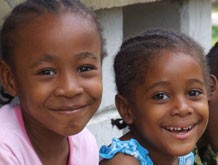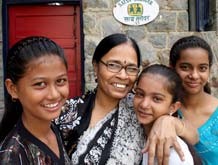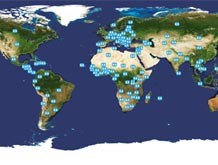SOS Children: Sponsor a child
SOS Children strives to ensure that every child grows up in a caring family environment. We do this in two key ways. First, we work to stop more than half a million children ending up alone, abandoned or in institutions. We do this by supporting families, helping communities, and providing education and healthcare. Secondly, for children who have no other hope of family life, we provide a new and loving home. These children have hope only thanks to the kindness of child sponsors. Have you considered sponsoring a child?
We need your help and support in helping keep families together and in sponsoring children so that we can provide family-based care for them. Child sponsors have helped make us into the world’s largest orphan and abandoned children’s charity.
Our vision is “a loving home for every child” and we have a rather unique approach to sponsorship which we think is the best for children and child sponsors alike. We choose locations where there are many orphaned or abandoned children. We conduct “root cause” research into why this is happening and then work outwards from the children in greatest need to the wider community to tackle these causes.
Child sponsors and donors worldwide provide a new family and home for more than 62,000 children in 545 unique Children’s Villages in 125 countries; we help ten children stay with their own family for every child in an SOS family.
You can be part of the life-changing charity work we do. By choosing to sponsor a child, you will ensure that a child who has lost their parents grows up in a safe and loving environment and benefits.
SOS Children: Offering real child sponsorship
We offer real child sponsorship, the way we think it should be done. Our donors help children whose parents are not there for them. They may be AIDS orphans, street children, child soldiers or children orphaned by war, poverty or natural disasters (see for example the current Syria Emergency Appeal). We give these children a mother and a family in a home within an SOS Children’s Village. Donations pay to build the Villages and run them until child sponsors cover the running costs. Where family life is at risk (for example where parents in Africa have AIDS), we run programmes to help strengthen families and keep them together. By choosing to sponsor a child, you will ensure that a child who has lost their parents grows up in a safe and loving environment and benefits.
Although we are always trying to improve it, our working model is very simple:
- We take groups of seven to ten lone children, and place them together with a permanent resident
SOS mother to make a family for life. In the developed world, this number might be fewer.
- A number of these SOS families group together to form a Children's Village - often, our Villages are made up of around 12 families.
- Much of our work takes place in the wider community. Here, we work with local people to provide the support and resources the neighbourhood needs.
- If there is no adequate medical care, we provide it.
- If there is no school, we build one.
- We help fragile families in the community provide a loving environment for the children in their care, tailoring guidance and support to the individual needs of family groups.
Our strategic goal for the coming years is to give a million children a family for life. Of these, one-hundred thousand children will be given a new family and home in an SOS Children's Village. With our support, nine-hundred thousand children who might otherwise grow up on the street will be brought up by their own extended family. This vital work would be impossible without the assistance of our many kind supporters who choose to sponsor a child.




 Return to Schools Wikipedia Home page…
Return to Schools Wikipedia Home page…
